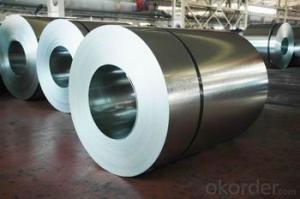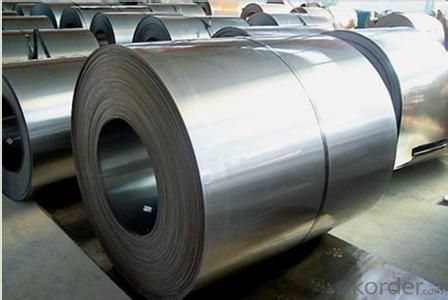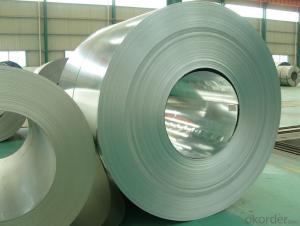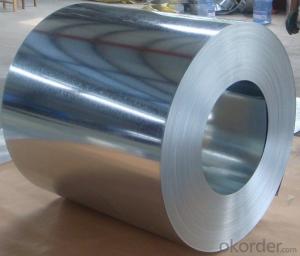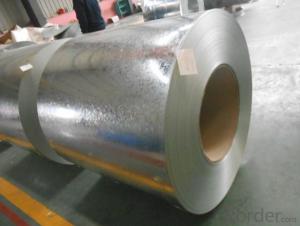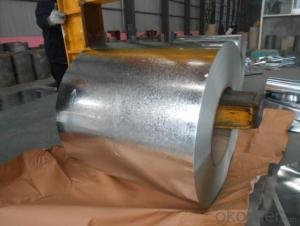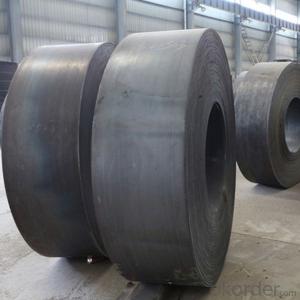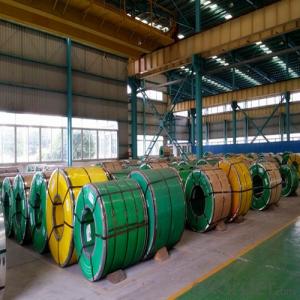Cold Rolled Steel Sheet in Coils with First Class Quality and Best Seller
- Loading Port:
- Shanghai
- Payment Terms:
- TT OR LC
- Min Order Qty:
- 100 m.t.
- Supply Capability:
- 10000 m.t./month
OKorder Service Pledge
OKorder Financial Service
You Might Also Like
1.Structure of Cold Rolled Steel Description:
The raw material of cold rolled steel coil/sheet is high quality hot rolled product, and after pickling continuous rolling, degreasing, annealing,skin pass,slitting and cut to length line etc. Along with it many kinds of new technology and new process of global cold rolling production have been applied. Therefore the quality of the goods could be guaranteed. The product is widely used in outdoor and interior decoration, furnishing manufacturing, home appliance, automobile etc.
2.Main Features of the Cold Rolled Steel:
• Excellent process capability
• Smooth and flat surface
• Workability, durability
• Excellent heat resistance performance
• High strength
• Good formability
• Good visual effect
3.Cold Rolled Steel Images
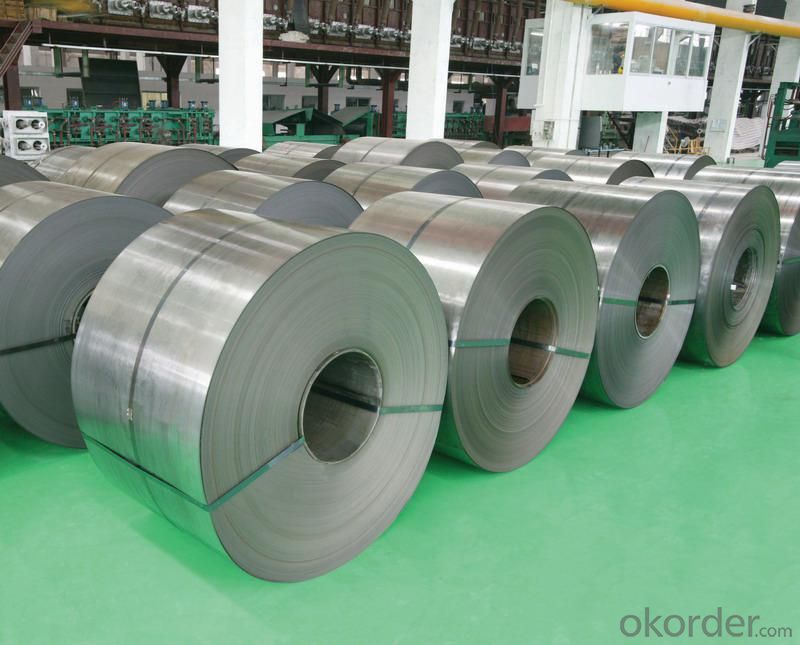
4.Cold Rolled Steel Specification
Standard:AISI,ASTM,DIN,GB,JIS,JIS G3302 ASTM 653M EN10142
Grade: Q195~Q345
Thickness: 0.16mm~1.5mm,0.16-1.5mm
Width: 1250,600-1250mm
Coil weight:3-12 MT
Coil ID:508/610mm
Chemical composition:
C | Si | Mn | Cr | Ni | P | S |
0.150 | 0.476 | 11.231 | 12.50 | 0.900 | 0.039 | 0.010
|
5.FAQ of Cold Rolled Steel
We have organized several common questions for our clients,may help you sincerely:
1.How about your company?
A world class manufacturer & supplier of castings forging in carbon steel and alloy steel,is one of the large-scale professional investment casting production bases in China,consisting of both casting foundry forging and machining factory. Annually more than 8000 tons Precision casting and forging parts are exported to markets in Europe,America and Japan. OEM casting and forging service available according to customer’s requirements.
2.How to guarantee the quality of the products?
We have established the international advanced quality management system,every link from raw material to final product we have strict quality test;We resolutely put an end to unqualified products flowing into the market. At the same time, we will provide necessary follow-up service assurance.
3. How long can we receive the product after purchase?
Usually within thirty working days after receiving buyer’s advance payment or LC. We will arrange the factory manufacturing as soon as possible. The cargo readiness usually takes 15-25 days, but the shipment will depend on the vessel situation.
- Q: How are steel coils used in the manufacturing of industrial compressors?
- Steel coils are used in the manufacturing of industrial compressors primarily for the construction of the compressor's casing and frame. The steel coils are shaped, cut, and welded to create the sturdy and durable structure that houses the compressor components. Additionally, the steel coils may also be used in the fabrication of other parts such as motor mounts or brackets, contributing to the overall reliability and stability of the compressor.
- Q: How are steel coils recycled?
- Steel coils are recycled by first being collected and transported to a recycling facility. They are then processed to remove any impurities or contaminants, such as coatings or oils. The coils are then shredded into smaller pieces and melted down in a furnace. The molten steel is then molded into new coils or other steel products, ready to be used again in manufacturing processes.
- Q: How are steel coils used in the production of food processing equipment?
- Due to their advantageous properties, steel coils find widespread use in the manufacturing of food processing equipment. These coils, typically crafted from stainless steel, are employed in the production of a diverse array of equipment, including mixers, blenders, conveyors, ovens, and fryers. The excellent resistance to corrosion exhibited by steel coils is one of the primary reasons they are preferred for use in food processing equipment. Stainless steel coils possess a high resistance to rust and can endure exposure to moisture and various food substances without deteriorating. This crucial characteristic ensures that the equipment remains hygienic and safe for food processing. In addition, steel coils provide exceptional strength and durability, enabling food processing equipment to withstand heavy use and harsh operating conditions. These coils can be shaped into various forms and sizes, making it possible to fabricate complex equipment components. This versatility facilitates the design and construction of equipment that is both efficient and reliable in processing a wide range of food products. Moreover, steel coils are simple to clean and maintain. The smooth surface of stainless steel prevents staining and simplifies the removal of food residues, thereby preventing the growth of bacteria. Regular cleaning and sanitation of food processing equipment are indispensable in maintaining food safety standards, and steel coils streamline this process, making it more effective. Furthermore, steel coils possess excellent heat conductivity properties, which facilitate efficient heat transfer in food processing equipment, such as ovens and fryers. This allows for precise temperature control and uniform cooking, ensuring consistent quality in the processed food products. In summary, steel coils assume a vital role in the production of food processing equipment by providing corrosion resistance, strength, durability, ease of cleaning, and efficient heat transfer. These qualities render steel coils an ideal material for manufacturing equipment that meets the stringent hygiene, safety, and quality standards required in the food processing industry.
- Q: How are steel coils used in the production of metal fencing?
- Steel coils are used in the production of metal fencing as they serve as the raw material for creating the wire mesh that forms the structure of the fence. The steel coils are uncoiled and then passed through a series of machines that shape and weld them into the desired fence panels or rolls. These panels are then further processed and treated to enhance their durability and resistance to corrosion, ultimately resulting in high-quality metal fencing products.
- Q: What are the common applications of pre-painted galvanized steel coils?
- Pre-painted galvanized steel coils have a wide range of applications across various industries. Some of the common applications include: 1. Construction: Pre-painted galvanized steel coils are extensively used in the construction industry for roofing, wall cladding, and structural components. The coating on these coils provides excellent corrosion resistance and durability, making them suitable for both residential and commercial buildings. 2. Automotive: These coils are also widely used in the automotive industry for manufacturing parts and components such as body panels, interior trims, and underbody protection. The pre-painted coating enhances the aesthetic appeal of the vehicles while providing protection against rust and corrosion. 3. Appliances: Pre-painted galvanized steel coils are commonly used in the production of home appliances such as refrigerators, ovens, washing machines, and air conditioners. The smooth and durable coating on these coils ensures a long-lasting and visually appealing finish for the appliances. 4. Furniture: The pre-painted galvanized steel coils find application in the furniture industry for manufacturing cabinets, shelves, and other furniture components. The coating on these coils adds a decorative touch to the furniture while offering protection against scratches and wear. 5. Electrical and Electronics: These coils are utilized in the electrical and electronics industry for manufacturing switchboards, control panels, and enclosures. The pre-painted coating provides insulation and protection against electrical hazards, making them suitable for such applications. 6. Agricultural Equipment: Pre-painted galvanized steel coils are also used in the agricultural sector for manufacturing equipment like grain silos, livestock shelters, and poultry houses. The corrosion-resistant coating on these coils ensures the durability and longevity of the agricultural structures. 7. Signage and Advertisement: The vibrant and visually appealing colors of pre-painted galvanized steel coils make them a popular choice for signage and advertisement boards. The coated surface provides a smooth and glossy finish that enhances the visibility and attractiveness of the signage. In summary, the common applications of pre-painted galvanized steel coils include construction, automotive, appliances, furniture, electrical and electronics, agricultural equipment, and signage and advertisement. These coils offer excellent corrosion resistance, durability, and aesthetic appeal, making them suitable for a wide range of industries and applications.
- Q: How are steel coils used in the production of electronic devices?
- Steel coils are used in the production of electronic devices for various purposes, such as creating magnetic fields, providing structural support, and acting as conductors in transformers and inductors. These coils are typically wound around a core material, such as ferrite or laminated iron, to enhance their magnetic properties and improve their performance in electronic circuits.
- Q: I was wondering what kind of company casts and sells steel without acting as a contractor as well. They only sell steel no install it
- If you are talking about raw steel materials and products I believe you are talking about a steel processor and warehouse company or a steel distributor. There are many different points along the steel manufacturing process that you could buy steel products. It would depend on various factors. Depending the amount, type, grade, gauge, properties, origin and a host of other elements you could purchase the steel in billet, plate, diamond plate, rolled sheet (cold or hot), coil, beam, stamped, pickled, scrapped, etc. You get the idea. Now I don't know where you are in the world, but you can go to one of the two sites below, which I have used for product sourcing and research before. The last one is a major manufacturer that I have actually been to. I hope this helps.
- Q: should I shoot Herters .308 steel cased ammo in my Remington 7400.and why shouldn't I?
- Kudos to NXile for his/her post. Ironically, I recently posted a similar answer in this forum and got many thumbs down. The problem with the non-expansion of steel cased ammo is not limited to the blow-back and soot build-up inside the action. The other problem is that your Remington 7400 was engineered at the Remington factory as a sporting firearm that uses brass cased sporting ammunition. When you switch to the steel cased ammo, the casing doesn't have a chance to grab at the walls of the chamber to slow it down. The result is heavier recoil on the action of the gun. Over time, you will break something. Also, I don't like the idea of steel rubbing against steel inside the chamber area of a gun. I know sure sure I won't use steel cleaning rods or brushes to clean the barrel of a rifle. So why would I want to chance shooting steel cased ammo? The only stuff I will shoot steel cased ammo out of are the junky SKS and AK style rifles that I don't care about. Anything with real value...and I only use brass ammo with non-corrosive priming.
- Q: How are steel coils used in the production of steel hinges?
- Steel coils are used in the production of steel hinges by being processed and formed into thin strips. These strips are then cut and shaped to create the desired size and shape of the hinges. The steel coils provide the raw material for the hinges, allowing for efficient and precise manufacturing.
- Q: How are steel coils tested for strength?
- Steel coils are tested for strength using a variety of methods such as tensile testing, hardness testing, and impact testing. Tensile testing involves applying a controlled force to the coil until it breaks, measuring the amount of force required to rupture the steel. Hardness testing measures the resistance of the steel to indentation or scratching, providing an indication of its strength. Impact testing evaluates the ability of the steel to absorb energy under sudden loading conditions. These tests help determine the overall strength and quality of the steel coils.
Send your message to us
Cold Rolled Steel Sheet in Coils with First Class Quality and Best Seller
- Loading Port:
- Shanghai
- Payment Terms:
- TT OR LC
- Min Order Qty:
- 100 m.t.
- Supply Capability:
- 10000 m.t./month
OKorder Service Pledge
OKorder Financial Service
Similar products
Hot products
Hot Searches
Related keywords
